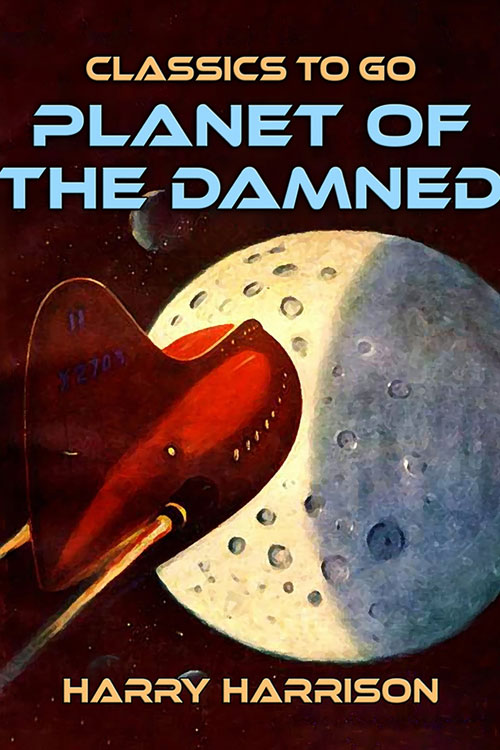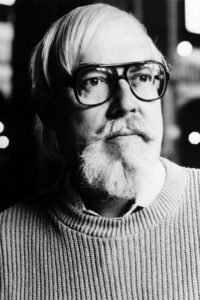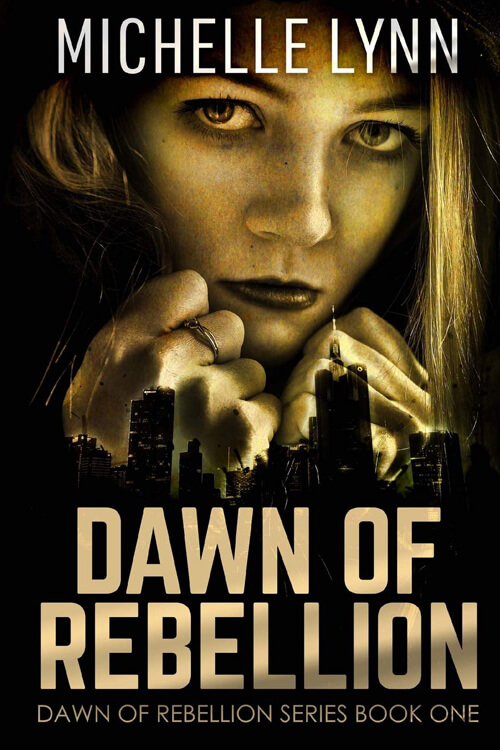
Planet of the Damned
“I wonder if those things are edible—or store water?” Brion’s voice was a harsh rasp. Lea blinked and squinted at the leathery shape on the dune’s summit. Plant or animal, it was hard to tell. It was the size of a man’s head, wrinkled and grey as dried-out leather, knobbed with thick spikes. Brion pushed it up with his toe, and they saw a white roundness, like a shiny taproot, going down into the dune. Then the thing contracted, pulling itself lower into the sand. At the same instant, something thin and sharp lashed out through a fold in the skin, striking Brion’s boot and withdrawing. There was a scratch on the hard plastic, beaded with drops of green liquid.
“Probably poison,” he said, digging his toe into the sand. “This thing is too mean to fool with—without a good reason. Let’s keep going.”
It was before noon when Lea fell. She wanted to go on, but her body wouldn’t obey. The thin soles of her shoes were no protection against the burning sand, and her feet were lumps of raw pain. Heat hammered down, poured up from the sand and swirled her in an oven of pain. The air she gasped was molten metal that dried and cracked her mouth. Each pulse of her heart throbbed blood to the wound in her scalp until it seemed her skull would burst with agony. Despite Brion’s insistence that she keep her body protected from the sun, she had stripped down to the short tunic that clung to her, soaked with sweat. She tore at it in a desperate effort to breathe. There was no escape from the unending heat.
Read or download Book
Harry Harrison
Harry Max Harrison (born Henry Maxwell Dempsey; March 12, 1925 – August 15, 2012) was an American science fiction author known primarily for his character The Stainless Steel Rat and his novel Make Room! Make Room! (1966). The latter was the rough basis for the motion picture Soylent Green (1973). Long resident in both Ireland and the United Kingdom, Harrison was involved in the foundation of the Irish Science Fiction Association. He was, with Brian Aldiss, co-president of the Birmingham Science Fiction Group.
Aldiss called him “a constant peer and great family friend”. His friend Michael Carroll said of Harrison’s work: “Imagine Pirates of the Caribbean or Raiders of the Lost Ark, and picture them as science-fiction novels. They’re rip-roaring adventures, but they’re stories with a lot of heart.” Novelist Christopher Priest wrote in an obituary.
Harrison was a trendy figure in the SF world, renowned for being amiable, outspoken and endlessly amusing. His quickfire, machine-gun delivery of words was a delight to hear and a reward to unravel: he was funny and self-aware, he enjoyed reporting the follies of others, he distrusted generals, prime ministers and tax officials with sardonic and cruel wit, and above all he made plain his acute intelligence and astonishing range of moral, ethical and literary sensibilities.
Career
Before becoming an editor and writer, Harrison started as an illustrator in the science fiction field, notably with EC Comics’ two science fiction comic book series, Weird Fantasy and Weird Science. In these and other comic book stories, he most often worked with Wally Wood. Wood usually inked over Harrison’s layouts, and the two freelanced for several publishers and genres, including westerns and horror comics. He and Wood split up their partnership in 1950 and went their separate ways. Harrison used house pen names such as Wade Kaempfert and Philip St. John to edit magazines and published other fiction under the pen names Felix Boyd and Hank Dempsey (see Personal Life below). Harrison ghostwrote Vendetta for the Saint, one of the long-running novels featuring Leslie Charteris’ character, The Saint. Harrison also wrote for syndicated comic strips, writing several stories for the character Rick Random.
His first short story, “Rock Diver,” was published in the February 1951 issue of Worlds Beyond, edited by Damon Knight; the magazine had previously published his illustrations. While in New York, he socialized at the Hydra Club, an organization of New York’s science fiction writers, including Isaac Asimov, Alfred Bester, James Blish, Anthony Boucher, Avram Davidson, Judith Merril, and Theodore Sturgeon.
Harrison has become much better known for his later writing, particularly his humorous and satirical science fiction, such as the Stainless Steel Rat series and his novel Bill, the Galactic Hero—which satirised Robert A. Heinlein’s novel Starship Troopers. Priest wrote:
His most famous and best-known work is in fast-moving parodies, homages or straight reconstructions of traditional space opera adventures. He wrote several named series of these: notably the Deathworld series (three titles, starting in 1960), the Stainless Steel Rat books (12 titles, from 1961), and the sequence of books about Bill, the Galactic Hero (seven titles, from 1965). These books all present fascinating contradictions: while being exactly what they might superficially seem to be, unpretentious action novels with a strong streak of humour, they are also satirical, knowing, provocative, unapologetically anti-military, anti-authority and anti-violence. Harrison wrote such books using the idiom of a politically conservative hack writer. Still, he had a liberal conscience and a sharp awareness of the lack of literary values in so much of the SF he was parodying.
Adi Robertson agreed: “His books toed the line between science fiction adventure, humour, and satire, often with a strong anti-military bent informed by his time in the U.S. Army Air Forces.”
He was the primary writer of the Flash Gordon newspaper strip during the 1950s and 1960s. One of his scripts was serialised in Comics Revue magazine. Harrison drew sketches to help the artist be more scientifically accurate, which the artist largely ignored.
Not all of Harrison’s writing was comic. He wrote many stories on serious themes, of which the best known is the novel about overpopulation and consumption of the world’s resources, Make Room! Make Room! (1966), used as a basis for the 1973 science fiction film Soylent Green (though the film changed the plot and theme).
For a time, Harrison was closely associated with Brian Aldiss. They collaborated on a series of anthology projects. They did much in the 1970s to raise the standards of criticism in the field, including the institution of the John W. Campbell Memorial Award for Best Science Fiction Novel. Priest wrote, “In 1965, Harrison and Aldiss published the first issue (of two) of the world’s first serious journal of SF criticism, SF Horizons. Together, they edited many anthologies of short stories, each illustrating SF’s major themes. Although not intended as a critical apparatus, the books were a way of delineating the unique material of the fantastic. As committed internationalists, the two men created World SF, an organisation of professionals intended to encourage and enhance the writing of non-anglophone SF.” In particular, the two edited nine volumes of The Year’s Best Science Fiction anthology series and three volumes of the Decade series, collecting the 1940s, 1950s and 1960s science fiction, respectively.






